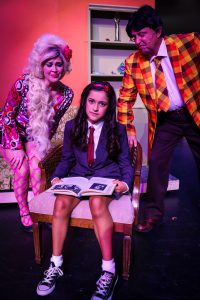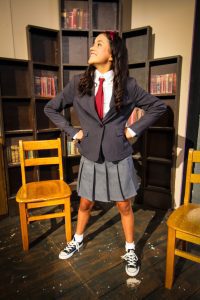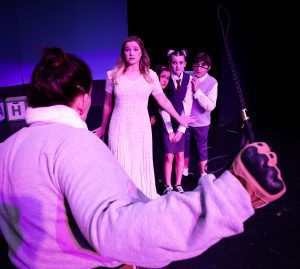REVIEW: Music Guild’s “Matilda” a Loud and Quiet (and Sometimes Muffled) Delight
As much as it pains me to say this, attending the last dress rehearsal for the new Quad City Music Guild production, “Roald Dahl’s Matilda,” was not a very pleasant experience. That’s not to say the super enthusiastic 32-member cast (most of whom are under 18) is not talented.
They did about the best possible job under some very trying circumstances, beyond everyone’s control. Namely, that Music Guild has

Melissa Anderson-Clark, Wrigley Mancha and Tony Hiatt in Music Guild’s “Matilda.”
complied with the recent CDC recommendations that everyone (cast and audience, vaccinated or not) wear face masks indoors.’
Not only was it distracting for me to have a mask on through the two-and-half-hour run time of the musical, but seeing (and more importantly, trying to hear) all the colorful stage actors was a challenge, and masks constantly took me out of the story and songs. I felt bad for the performers, being asked to entertain kind of like a juggler having to work with a hand tied behind his back. It’s a small price to pay to stay safe and healthy, right?
Directed by Heather Beck, with music direction by her husband Adam, this “Matilda” is perfectly cast and masks simply cannot take away the power and strength of each ideally suited to their role – 13-year-old

Sam Whan, Lauren VanSpeybroeck and Melissa Anderson-Clark in Music Guild’s “Matilda.”
Wrigley Mancha as the smart, book-obsessed title character, Tony Hiatt and Melissa Anderson-Clark as her selfish, rude, boorish parents; Lauren VanSpeybroeck as her warm, comforting, supportive teacher, and Sara Wegener as the staggeringly evil, cruel and insulting headmistress. The battle between good and evil has never seemed so stark as in this show.
The stellar set design by Guild veteran Kevin Pieper also is a frequent delight, from start to finish. I loved the children’s letter blocks on top of the library backdrop, that spell out Matilda’s name, and more blocks are used as classroom seats. The impressive backdrop with larger-than-life books was painted by Guild veteran Harold Truitt. “The Secret Garden” (a 1911 novel) is there, as well as other classics turned musicals – “Matilda,” “Little Women,” “Peter Pan,” “Les Miserables” and “Don Quixote.” Small, carefully designed sets on the left and right corners of the stage are also used to great effect.
Though the popular children’s story here is painted with very broad, cartoonish brush strokes (not requiring much detail), it is occasionally frustrating to not be able understand large chunks of song lyrics, due to the muffled projection blocked by masks. Overall, it is much easier to make out words when they are spoken and the actors who are best at overcoming these obstacles are the most experienced – Wegener, Anderson-Clark and VanSpeybroeck. If you closed your eyes, you probably couldn’t tell they were wearing masks.
Wegener – as the callous, sadistic, colossally imposing Miss Trunchbull – said earlier in the week that she absolutely adores playing someone so unrepentantly mean and villainous (Agatha’s motto is “Children are maggots!”), and it shows on stage. It seems the role of a lifetime for

Wrigley Mancha, 13, plays the title character in “Matilda: The Musical.”
her, and she wildly pulls out all the stops in a literally huge portrayal. In the second act, Wegener is like a tyrannical, merciless, inhuman drill sergeant, reviewing her troops. That workout scene, however, is excruciatingly long, and a comparable heartless, spiteful scene from the first act has Trunchbull force a student to eat an entire chocolate cake – which drags on and on, made even more inexplicable by the fact that the boy (Bruce, played by Micah Roldan) is wearing his mask (!?!).
From the show start, it’s also easy to hate Hiatt and Anderson-Clark as the equally cruel and vindictive Mr. and Mrs. Wormwood, who don’t have a fraction of the maturity, intelligence or humanity as Matilda. When the girl is born, the father wants to exchange her for a boy and mom says it’s the worst day of her life. When Matilda gets to be eight, and is a genius for her age, her parents constantly belittle her and ridicule her for reading. Another annoying point of the story is the repetition of Mr. Wormwood calling her “boy,” and she responds, “I’m a girl” (which quickly becomes tiresome).
Anderson-Clark plays against type as the shallow, uncaring mother, and her enunciation is consistently flawless. Flirting with her Italian dance instructor Rudolpho, it’s hard to miss anything Melissa sings in the characteristic “Loud” in Act I, which applies both to her personality and voice volume. She’s brassy, brainless

Sara Wegener, left, Lauren VanSpeybroeck, Wrigley Mancha, Ellerie Hurley and Micah Roldan in “Matilda.”
and truly obnoxious.
Hiatt – in his loud, garish orange plaid suit – is a perfect match for Anderson-Clark and another despicable, self-centered character. He “distinguishes” himself at the beginning of Act II, where Mr. Wormwood makes his case against reading and brings up the house light to interact a bit with the audience. At other points, he sings the praises of TV, literally tosses books into a trash can and proclaims his own “brilliance” in “I’m So Clever.” Hiatt appropriately puts a lot of passion into his delusional part.
The silly story (which late in the show suddenly introduces Matilda’s gift of moving objects with her mind) and Guild’s production are redeemed by the good and noble roles – Wrigley as the defiant, brave, confident Matilda; VanSpeybroeck as the luminous, wonderful Miss Honey; Sam Whan as the warm-hearted Escapologist and doctor (in the first scene, who also is Rudolpho), and Ali Knollenberg as the sweet Mrs. Phelps, who listens to Matilda’s mesmerizing tale about an acrobat and the escapologist. Those scenes – in spotlight against a black curtain at center stage – are dramatically and sensitively done.
Wrigley showcases an amazingly strong voice in the title role (such as the key contrast song, “Quiet”), and her bond with VanSpeybroeck is

Ali Knollenberg, left, and Wrigley Mancha in Music Guild’s “Matilda.”
clear and heartwarming. Miss Honey is everything Mrs. Wormwood isn’t – quiet, thoughtful, sympathetic and humble, and VanSpeybroeck reveals it all in a glorious, understated performance. Listen for her hold transcendent high notes during the innocent, childlike “When I Grow Up” (a poignant highlight with the kids). Lauren also is winningly tender, gentle and simply beautiful in “This Little Girl” and “My House.”
The climactic classroom scene where students finally overcome and exact revenge on Trunchbull is fittingly urgent and dramatic, though it’s both hard to tell what’s being written on the chalkboard (due to Matilda’s powers) and what Trunchbull is screaming about, as long as she gets banished, that’s all we care about.
She had called the children “revolting,” and they really did revolt against her, and celebrate their win in the big “Revolting Children.” Hillary Erb’s energetic choreography is capably handled by all involved. Michael Schmidt also makes a standout appearance at the end, as the colorful Russian mobster Sergei.
Performances of “Matilda” continue at 7:30 p.m. tonight (Saturday), plus Aug. 12-14, and at 2 p.m. Sundays, Aug. 8 and 15. Tickets are $16 for adults, and $11 for children, available at 309-762-6610 or www.qcmusicguild.com.









